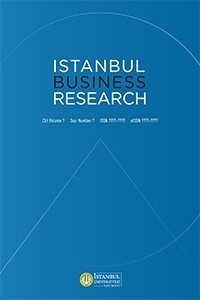
Istanbul Business Research
Yazarlar: Hakan TELÇEKEN, Süleyman DEĞİRMEN
Konular:-
Anahtar Kelimeler:Fisher Hypothesis,Loan Interest Rates,Inflation,Structural Break Unit Root,ARDL Bound Cointegration
Özet: In this study, the relationship between inflation and interest rates for Turkey’s economy and whether this is a long-term relationship were tested out using the Fisher hypothesis for the period of 2002:M1-2018:M6. In the study, it was tested if there is a long-term relationship from demand-pull inflation toward Individual Loan Rates, and from cost-push-tosupply inflation toward Commercial Loan Rates using Fisher’s hypothesis. Subsequently, structural break unit root test was performed in order to determine if there is structural breakage in the economy. According to Granger causality test results for the period, there was a unidirectional causality for Turkey’s economy from both the Consumer Price Index to the Individual Loan Interest rates and from the Producer Price Index to Commercial Loan Interest rates. In addition, the results of the ARDL bound test for cointegration showed that, there is no long-term cointegrated relationship from CPI to Individual Loan Rates, while a long-term cointegrated relationship is seen from PPI toward Commercial Loan Rates. Therefore, this long-term relationship is not one-to-one as stated by Irving Fisher, and implies that a 1% shock to PPI affects the Commercial Loan Rates by 0.45% in the long term.